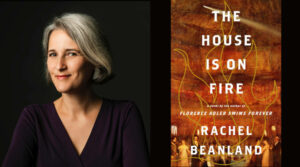
Andrew Lapin
A South Florida Jewish community center has landed in the middle of the state’s culture wars after canceling a talk by an author whose novel focuses on race in America.
The Mandel JCC in West Palm Beach had booked Jewish author Rachel Beanland to headline a $100-a-plate luncheon in January 2024. The plan was for Beanland to discuss her latest novel, “The House Is On Fire,” a work of historical fiction concerning a deadly Richmond, Virginia, fire in the early 1800s that the city tried to blame on its enslaved population.
But in August, Beanland received an email from the JCC’s arts and culture manager asking for more details about her planned presentation and seeming to imply that it would be best to steer clear of some topics.
“Of course, this is Florida and our politics around the Black community, the history of the Civil War, and education in general are … complicated,” the employee wrote. The ellipsis was present in the original message.
For Beanland, the language was shocking. “I don’t think I was wrong to interpret it in this way: It was asking me not to talk about Black people,” she told the Jewish Telegraphic Agency.
Beanland wrote back with her publicist copied on the email to say that “any presentation I give is likely to address slavery and the rights of women.” A few weeks later, the JCC employee wrote back.
“After much discussion and debate, we have decided that this book is not the right choice” for the scheduled event, the employee wrote, adding, “Also, our decision is very much affected by the current political climate here in Florida.”
Last week, Beanland made the email exchange public by posting it to Instagram. The JCC issued a public apology on Monday. On Tuesday, the Jewish Book Council, a major organization for Jewish authors, issued a statement criticizing limits on free expression and calling for Beanland to be reinvited.
The episode highlights the new ways in which Jewish authors and even institutions have become embroiled in a broad effort, driven by conservatives, to constrain how race and racism are discussed in public. Florida has been an epicenter of that effort, with Gov. Ron DeSantis urging his state education department to deemphasize race in school instruction and inviting parents to challenge books in school libraries. DeSantis barred public schools from using the national Advanced Placement African-American history curriculum, prompting it to be revised, and the state recently approved new guidelines that historians and activists say whitewash topics such as slavery and racism. DeSantis ignited a firestorm in July when he defended the guidelines and said slavery afforded benefits to some people who experienced it.
The state’s guidelines do not apply to non-public schools and institutions, but the emails from the West Palm Beach JCC employee add to a growing body of evidence that a chilling effect can be felt beyond the letter of the law.
“Obviously, we were dismayed to see this happen,” Naomi Firestone-Teeter, executive director of the Jewish Book Council, told JTA.
The council promotes Jewish books and authors and facilitates a virtual author marketplace to give JCCs and other Jewish institutions the chance to book authors for events. The Mandel JCC had booked Beanland through this network, which, Firestone-Teeter said, made the cancellation particularly disappointing to the council and led to its decision to issue a statement criticizing the JCC.
“When our sites make commitments, it’s our hope that they would honor the commitments that they’re making to our authors,” Firestone-Teeter said.
After Beanland posted the exchange with the JCC employee, who has not been named publicly, the center’s CEO Jesse Rosen spoke to her by phone. Beanland insisted that Rosen issue a public apology, which he did Monday, on the JCC’s Instagram page.
“We are deeply sorry for what our JCC communicated with Rachel, as it does not reflect the values we stand for,” Rosen and board chair Joel Yudenfreund wrote.
They added, “We are deeply committed to promoting diverse voices, opinions, and perspectives,” and said that the opinions about Beanland’s talk came from two members of their volunteer-run book committee, whose views “are completely counter to our values.”
Speaking to JTA, Rosen said the employee in question had been terminated, but for a separate issue. He condemned the employee’s emails and said they did not reflect the JCC’s views.
“The wording that she used is just not who we are, and doesn’t represent the work we do,” he said. “We hope that you look at the 40 years of work we’ve done, including many [on] slavery and civil rights and LGBTQ and other topics — that we’ve never been afraid to have hard conversations. That’s what we do.”
He also said that the email’s wording, in addition to being inappropriate, wasn’t reflective of “the actual reasons” why the center canceled the talk. Instead, he said, the committee had determined that the event would be too “topically similar” to one the previous year that had also focused on slavery — evidence he also cited for why he believes the JCC has “a long history of taking on hard topics, and we have every intention of continuing to.”
Both Beanland and the Jewish Book Council say it should have been clear from the outset that her book discusses slavery. For Beanland, the bigger issue is that the center’s actions are in line with the state’s larger culture war over Black history — and an abdication of a Jewish responsibility.
“I feel like if there’s any community in the United States outside of the African-American community that should understand how essential it is for us not to erase or obscure history, it should be the Jewish community,” she said. “And in light of everything that’s happening in Florida, and the fact that DeSantis has kind of ushered in this wave of legislation that is really trying to make African-American history, Black history, just disappear — it felt really concerning.”
Beanland’s publisher, Simon & Schuster, supported her in a statement.
“Difficult subjects will not go away by pretending the books that address them don’t exist,” the publisher told the Richmond Times-Dispatch. “We stand against book banning in all its forms, including preemptive self-censorship.”
Rosen insists, despite the employee’s email, that the JCC’s staff never discussed the political climate when determining their bookings.
“There was just never any conversation that, based on whatever’s happening in the state or the country, that we need to adjust what we do or how we do it,” he said. “It never, ever even entered into the conversation.”
Rosen further insisted that Beanland hadn’t been entirely disinvited from the center, only asked to headline a smaller event instead. But Beanland told JTA she had no interest in doing so. “I was obviously pretty offended” at seeing the event downgraded, she said.
Rosen said he was hoping to have discussions with the Jewish Book Council to determine “her willingness to come to our community still.” He added, “We certainly know we need to apologize, and we’re never trying to not have the conversation.”
In its own statement, the Jewish Book Council criticized the JCC’s initial decision but said it was “heartened by this apology.” It added that it hoped the invitation would be returned. (Jewish Book Council president Elisa Spungen Bildner, who co-signed the statement with Firestone-Teeter and co-president Joy Greenberg, is a board member of JTA parent company 70 Faces Media.)
The prospect of Beanland accepting such an invitation seems unlikely. She told JTA she’s “not interested in ever talking to them again.”






